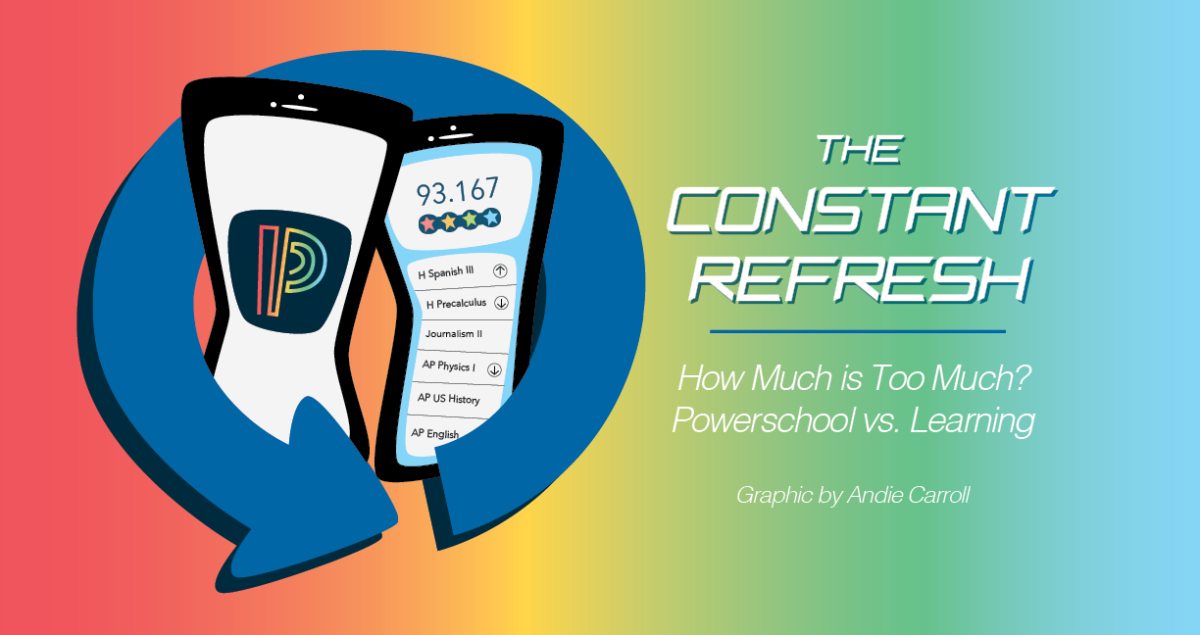Caroline Cioffi, Reporter
@cciofficourant
While attending one of the most competitive high schools in the country, many NCHS students find themselves obsessed with PowerSchool. Students are often overcome with pressure from their parents as well as other figures in the community, some going as far as to equate the numbers they see on PowerSchool to their own self-worth. Caught up in the fear of not meeting these lofty standards, students use PowerSchool to check their grades as many as 20 times a day, mindlessly logging into the application just to reassure themselves or, perhaps, find motivation.
According to senior Grant Wang, the PowerSchool addiction is characterized by a compulsive desire to check the app, even when students don’t have a conscious reason to do so. Grant explained that during his sophomore year, he would check the app as many as three times every period. “You just subconsciously go on your phone and type in New Canaan PowerSchool and you don’t really realize that you’re doing it after some time,” he said. “Then, all of sudden, you snap back into reality and you say, ‘oops, why am I on here again? There’s nothing to check.’”
Junior Caroline Mayock, has found herself caught in a similar cycle; she checks her grades typically, four or five times a day. “I just feel like I have to constantly check [PowerSchool] to reassure myself and just kind of make sure that everything is going well and I’m keeping up with all of my grades,” she said.
Through experience, Caroline has found that her grades are not always, in her opinion, indicative of her learning. “Sometimes I’ll study really hard for a test and I still won’t get that good of a grade on PowerSchool and sometimes that’s disappointing,” she said. “It’s really discouraging that you worked so hard for that test and then you go and you check PowerSchool and you didn’t do well,” Caroline said.
The issue Caroline described, commonly known as the “Grades vs. Learning Debate”, continues to perplex students, teachers, and counselors alike. Having taught AP History at the high school for 25 years, Mr. Webb has seen his fair share of students agonizing over the grades they see on PowerSchool. He attributed this stress to what he referred to as a ‘triple wall’. “The community pressures [students], parents pressure [students], teachers pressure [students], and kids are trapped,” he said.
Mr. Webb expressed his concern for students’ infatuation with grades. “[Students], on some level, are at odds with their goals, so what you find is this gap between what teachers want and what kids want … and it’s hard to get in the way of a kid who really wants just a good grade and doesn’t care about learning,” he said.
In terms of minimizing the stress that causes this type of attitude, Mr. Webb suggested that kids should look to their teachers for assistance. “What a lot of kids don’t realize is how us teachers want the kids to do better and will create avenues for them to do better,” he explained. “Teachers are really wonderful people and want the best for their students,” he said.
Cynthia Rivera, the School Counseling Office’s Department Chair, has also focused on finding ways to negate students’ stress induced by grades. “There is tremendous anxiety over (grades) and (students are) not thinking just about how they’re learning every day,” she said.
In terms of the Guidance Office’s efforts to combat the issue, Mrs. Rivera stresses that students should shift some of their priority to their lives outside of school. “I think our conversations as counselors with students focus a lot on what do you enjoy? Where’s the fun in your life? Take it away from the grade. And that’s hard for a lot of students,” she said. “They’re so focused on improving their grades that when I say, ‘Where are you really passionate about learning? What would you like to learn?’ they’re like, ‘I have to stop and think about this. What does that question mean to me?’” she said.




